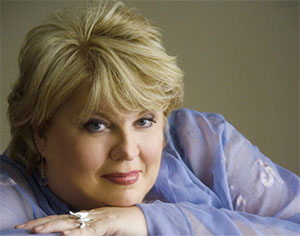by Timothy Robson
Just before
The overarching theme of the recital was that of memories of home and the desire of people to return home. Samuel Barber’s Knoxville: Summer of 1915 was a daring choice to start the concert, even if Ms. Brewer had been in top form. The music is technically challenging, requiring a very wide vocal range, both lyric and dramatic singing, as well as several pianissimo “floated” high notes. Barber’s 1947 fifteen-minute cantata, written for another great American soprano, Eleanor Steber, is based on a nostalgic excerpt by American writer James Agee. Barber’s music reflects the moods of the text, with rocking lullabies and excited memories of the author’s home town.
Whether by choice or indisposition, Ms. Brewer dropped several of the high notes down an octave, and at the end of the work, as Barber’s music draws to a conclusion setting the text “but will not, no, will not, not now, not ever” dramatically, then the final words “but will not ever tell me who I am” high and soft, Ms. Brewer ignored the composer’s dynamics and sang the whole passage in a fierce fortissimo, as if making a statement of independence. If one is going to ignore a composer’s instructions, it must be done with conviction. Ms. Brewer’s interpretation was unexpected and jarring for one familiar with the work, but effective in and of itself. Mr. Terry captured the general flavor of Barber’s orchestrations in the piano reduction with wide dynamic range and rhythmic flexibility.
Alan Smith’s cycle Letters from George to Evelyn sets excerpts of letters from a newlywed husband separated from his wife by military service in World War II Europe. They are vivid love letters, in which George describes his surroundings while stationed in England, France and Germany. The fourth song, set in staccato repeated notes, is a setting of the telegram from the United States Adjutant General informing Evelyn that George has been killed in combat. The epilogue sets in dreamlike music George’s profession of love to Evelyn, with the closing words, “Gotta run now baby. Love, George.”
Smith’s music, harmonically conservative and declamatory, with occasional flights of lyricism, reflects the emotions of the letters, although it is not particularly memorable by itself. The cycle is something of a signature piece for Ms. Brewer (she performed it several years ago at Baldwin Wallace University) and the emotional depth that she brought to the music and words was the high point of this recital. She held the audience’s rapt attention throughout.
The second half of the recital was devoted to popular songs from roughly the World War II era, 1939-45. In spoken remarks, Ms. Brewer, noting that Mr. Terry had helped choose the selections (“Blame him if you don’t like them”), said that they were all songs that George and Evelyn might have heard on the radio at the time of their letters. The theme of memories of home was woven through the eleven songs. The songs ranged from Richard Rodgers’s “With a Song in My Heart” to Fats Waller’s “Ain’t Misbehavin’” to “The White Cliffs of Dover,” made famous by British singer Vera Lynn in 1942 and one of the most famous World War II songs.
Ms. Brewer did not treat the songs as jazz, in the manner of a previous famous American dramatic soprano, Eileen Farrell; rather, she took them more as art songs, using her full soprano range. Mr. Terry’s accompaniments were extraordinary, played as if he was improvising on the spot, with total attention to the mood of each song. One can’t help thinking that in some past life, prior to being the chosen accompanist to Met divas, he must have had a side job as pianist in a cocktail bar.
Ms. Brewer saved the best for last: as an encore she sang one of her favorites, “Mira” from the 1961 musical Carnival, with music and lyrics by Bob Merrill. The character sings of the small town that she came from, where “everyone knows my name.” As a homegrown American diva with roots in the Midwest, but having performed to acclaim all over the world, Ms. Brewer’s performance was especially touching. Her phrasing of the line “Can you imagine that?” had the sense of wonder that must come from achieving once-unexpected fame and celebrity. At least one listener in Mixon Hall had a tear in his eye at the end.
Published on ClevelandClassical.com March 10, 2013
Click here for a printable version of this article.



